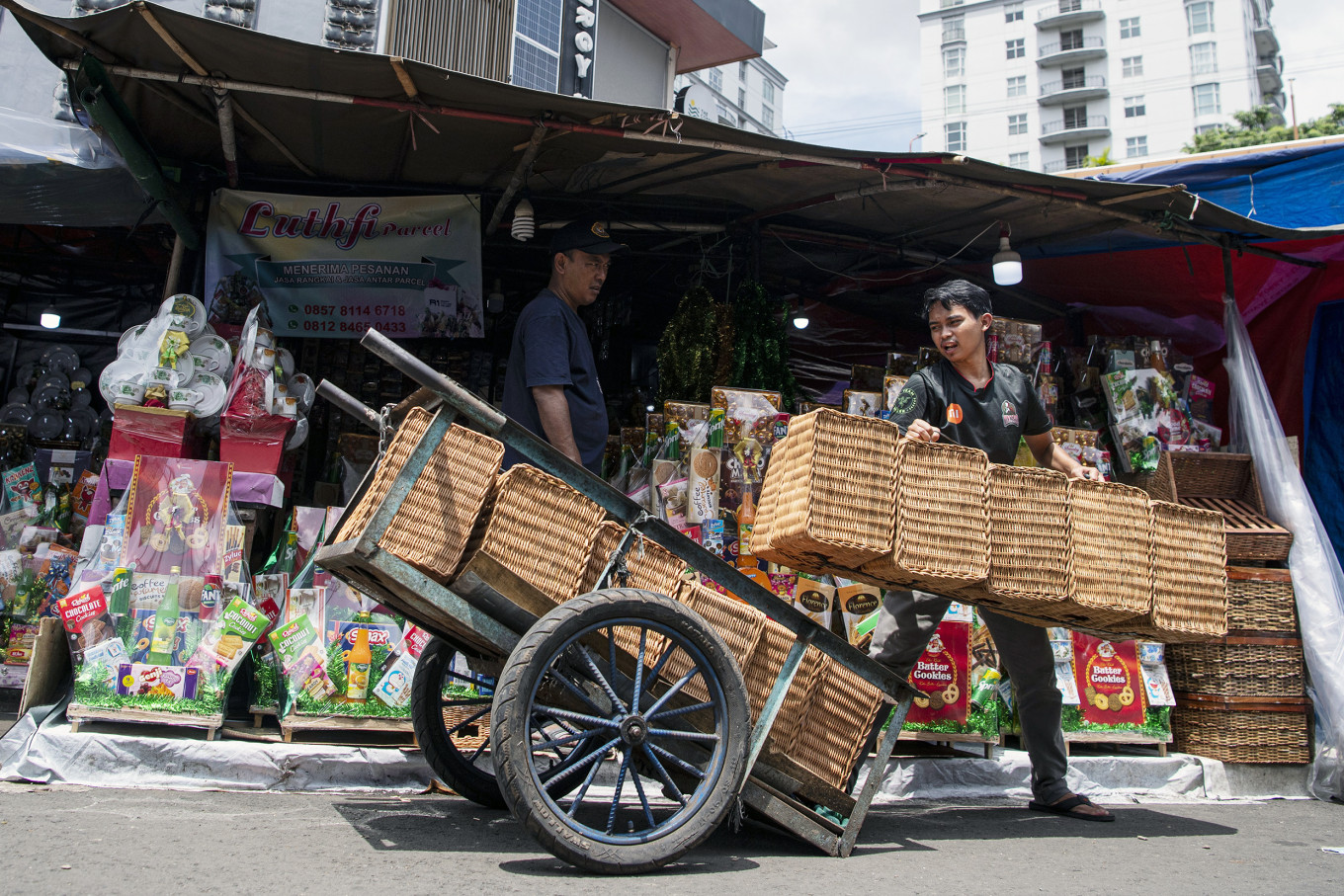Popular Reads
Top Results
Can't find what you're looking for?
View all search resultsPopular Reads
Top Results
Can't find what you're looking for?
View all search resultsInflation falls below 5% for first time since fuel price hike
Inflation slowed down in March partly due to a base effect, but the real impact of Ramadan may bump consumer prices up this month.
Change text size
Gift Premium Articles
to Anyone
I
nflation has dropped below 5 percent for the first time since the government raised fuel prices in September of last year, with the March data coming in lower than analysts had expected.
However, the effect of Ramadan may bump the rate up again this month, according to economists.
Statistics Indonesia (BPS) announced on Monday that the consumer price index (CPI) had increased by 4.97 percent year-on-year (yoy) last month, marking a slowdown from the rate of 5.47 percent recorded in February. The monthly inflation rate rose marginally to 0.18 percent in March from the 0.16 percent increment logged in the preceding month.
The headline inflation figure matched a forecast from Bank Permata but was lower than predictions by Bank Mandiri and Moody's Analytics for CPI growth of 5.09 percent and 5.6 percent, respectively.
Consumer prices were pushed up by higher transportation costs in March, which were up 13.72 percent from a year earlier, largely due to a hike in airfares, according to the BPS data.
Products in the food, beverages and tobacco segment cost 6.05 percent more than a year earlier, driven largely by higher prices of rice and filtered cigarettes.
Faisal Rachman, an economist at Bank Mandiri, explained that the slowdown in headline inflation was partly attributable to a base effect caused by the spike in inflation logged in March of last year, when food and energy prices surged following the breakout of war between Russia and Ukraine and Indonesia's revocation of the retail price ceiling for cooking oil.
A successful harvest season for vegetables and poultry, as well as lower crude palm oil (CPO) prices, also helped tame inflation in Indonesia last month, according to Bank Danamon economist Irman Faiz.
Read also: Inflation accelerates to 5.47% in February
Core inflation, which has become the de-facto basis for BI's interest rate policy, eased to 2.97 percent in March from 3.09 percent in the preceding month. Core inflation excludes from the CPI calculation certain food and energy products that tend to have volatile prices.
BPS announced that rice prices at wholesalers and retailers were up 0.43 percent and 0.70 percent month-to-month (mtm), respectively, despite a monthly drop in prices at the mill level.
"There is still a psychological effect after the government decided to raise the price ceiling of rice last month. If grain prices go down, it is usually followed by a rice price drop. We may see [such] progress in the coming months," Pudji Ismartini, who is in charge of statistical services and distribution at BPS, said in a press conference on Monday.
Full Ramadan effect in April
The increase in food prices was the main contributor to monthly inflation in March, with Ramadan and the attendant demand boost starting that month, according to Bank Mandiri's Faisal.
At 0.18 percent, the monthly inflation rate in March was lower than is typical for the month marking the beginning of Ramadan.
"[The low inflation rate] was caused by [the fact that] people's consumption patterns haven't come back to normal yet. Demand hasn't hit its peak as it is still the beginning of Ramadan. The inflation was also contained by several commodities that saw deflation, such as clean water costs," said BPS' Pudji.
The cost of clean water had pushed consumer prices up in January as the regional government in Bandung hiked the price ninefold to Rp 9,000 per cubic meter, only to revoke the measure in February.
Read also: RI growth to moderate despite China reopening
Bank Danamon's Irman said that as the fasting month had only begun in the last week of March, Indonesia hadn’t seen its full impact just yet.
"Core inflation could rebound in April, as the purchasing managers' index (PMI) is still in expansion mode at 51.9," Irman said in a statement.
Josua Pardede, the chief economist of Bank Permata, explained that he had not seen a significant Ramadan-induced rise in volatile prices or core inflation so far, “due to the absence of the increase in clothing prices, which usually jump before Ramadan".
Speaking to The Jakarta Post on Monday, he agreed that seasonal inflation during Idul Fitri could occur but said the effect might be "limited" as it coincided with the harvest period.
"In the short term, the government needs to intervene in the food market to prevent a surge of volatile price inflation," Josua said.
Bank Mandiri's Faisal also expected monthly inflation to increase seasonally amid the upcoming Idul Fitri holiday, mostly driven by a rise in food, hospitality, travel, restaurant and leisure service prices.
"Historically, monthly inflation jumps to between 0.5 percent and 0.7 percent during those periods," Faisal noted.
Annual inflation would continue to ease, he said, but it would remain above 4 percent at least until mid-year. He maintained his full-year inflation forecast of around 3.6 percent.










